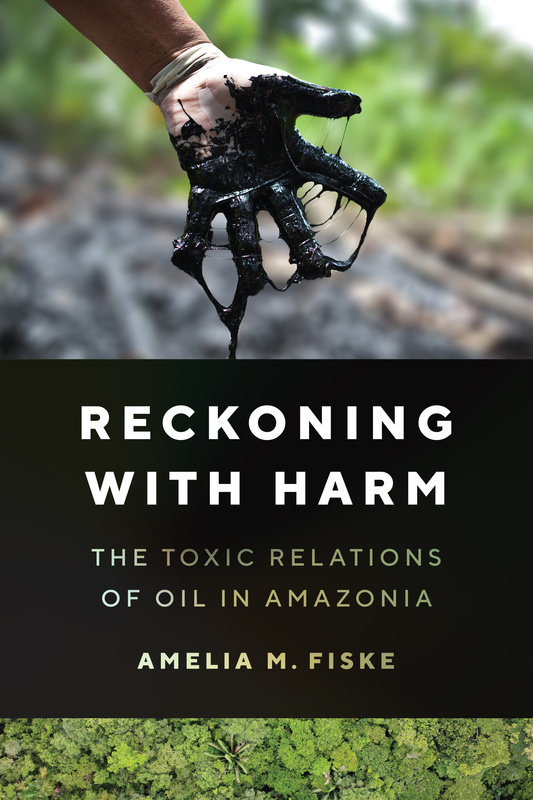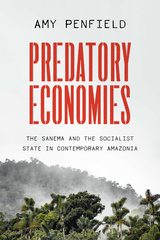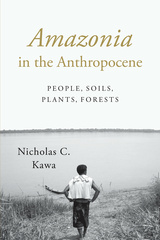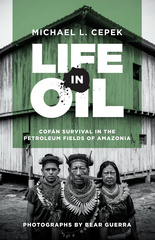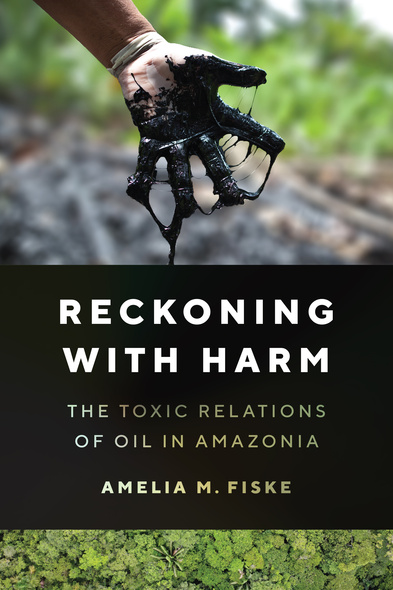
Reckoning with Harm
The Toxic Relations of Oil in Amazonia
An ethnography of the Ecuadorian Amazon that demonstrates the need for a relational, place-based, contingent understanding of harm and toxicity.
Reckoning with Harm is a striking ethnographic analysis of the harm resulting from oil extraction. Covering fifty years of settler colonization and industrial transformation of the Ecuadorian Amazon, Amelia Fiske interrogates the relations of harm. She moves between forest-courtrooms and oily waste pits, farms and toxic tours, to explore both the ways in which harm from oil is entangled with daily life and the tensions surrounding efforts to verify and redress it in practice. Attempts to address harm from the oil industry in Ecuador have been consistently confounded by narrow, technocratic understandings of evidence, toxicity, and responsibility. Building on collaborators’ work to contest state and oil company insistence that harm is controlled and principally chemical in nature, Fiske shows that it is necessary to refigure harm as relational in order to reckon with unremediated contamination of the past while pushing for broad forms of accountability in the present. She theorizes that harm is both a relationship and an animating feature of relationships in this place, a contingent understanding that is needed to contemplate what comes next when living in a toxic world.
Reckoning with Harm paints a vivid and distressing picture of the Ecuadorian Amazon, where the entwining of oil and life has left an enduring impact on both the environment and the people who call this place home . . . The lessons within this book are immeasurable.
Reckoning with Harm is an exceptional study of the production of socioecological suffering arising from predatory oil extraction in the Ecuadorian Amazon...[Fiske] skillfully weaves scholarship across disciplines, presenting a novel exploration of how such forms are being attended to, verified, and contested...[Reckoning with Harm] poses crucial questions about responsibility and the long shadows of resource extraction while offering nuanced analysis of the complexities. A must-read for students and scholars of Latin American history and environmental injustice in contexts of resource extraction.
In sum, Amelia Fiske’s historic and ethnographic study includes oil harms to local indigenous forest residents but clearly introduces and details many colonists’ poorly-known lives…many with critical local and long-term health suffering, amidst defensive corporate explanations. As with the broad human rights demands now linked to forested Amazonian Indigenous groups, many poor and recent colonists deserve similar international support.
A refreshingly nonprescribed approach to a contentious environmental history...offers a nuanced and complex understanding of oil extraction that adeptly communicates why remediation and resolution are difficult but overdue...reminds us that even if the injustice seems remote, we cannot extract ourselves from the toxic trauma occurring in the Amazon.
An empathetic and reflexive ethnography of the expansiveness of the socioenvironmental burdens—physical, emotional, generational—borne by peoples in the Ecuadorian Amazon because of the oil industry’s presence in the region. Recognizing the responsibility required to respectfully tell stories about harm, Fiske goes beyond technocratic explanations of regulatory science and law and instead traces the myriad relations through which harm is constituted and evaluated, intimately and expansively. In a search for larger truths that ‘open up’ harm from narrow understandings of culpability and damage, Fiske moves toward a theory of relational accountability—a reckoning—that calls for collective acts of reparation, remediation, and justice.
In her agenda-setting study of oil’s transformation of Amazonian Ecuador, Amelia Fiske brilliantly demonstrates the power of medical anthropology and science studies by combining nuanced ethnography, textual analysis, and theoretical engagement to reveal the harms of industrial toxins as well as their scientific, legal, and regulatory concealment. For anyone interested in understanding the complex question of how we can become certain of the petroleum industry’s impacts on this planet and its peoples, Reckoning with Harm is an essential source that will guide scholarship, activism, and public debate for decades to come.
Reckoning with Harm disarms, revealing that the wounded worlds that issue from oil extraction are deeply relational. A keen ethnographer, Amelia Fiske demonstrates in moving prose how the unbounded, yet embodied, effects of oil operations on everyday lives confound techno-industrial-scientific logics that seek to contain contamination.
Amelia M. Fiske is a senior research associate at the Institute for History and Ethics in Medicine at the Technical University of Munich in Germany.
- Acknowledgments
- Abbreviations
- A Note on Transcriptions
- Oil: A Visual Glossary
- Introduction. Encountering Harm
- Chapter 1. Building a Life on the Aguarico
- Chapter 2. Evidence
- Chapter 3. Bounding Harm
- Chapter 4. Toxic Exposures
- Chapter 5. Touring Toxic Places
- Conclusion. Relations of the Aguarico-4 Well
- Epilogue: Una Masa Dura
- Notes
- Works Cited
- Index

